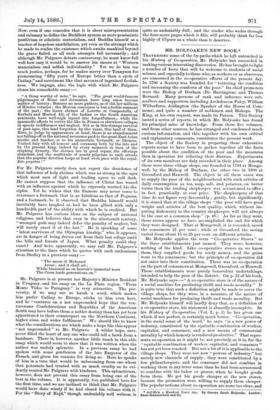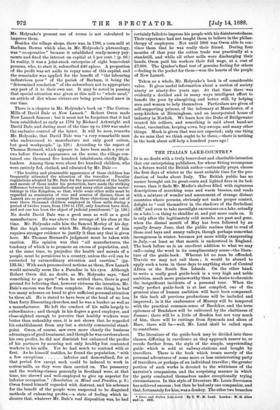MR. HOLYOAKE'S NEW BOOK.*
TRAVERSING some of the by-paths which )2e left untouched in his History of Co-operation, Mr. Holyeake has succeeded in making various interesting discoveries. He has brought to light a number of facts that will be welcome to students of social science, and especially to those who, as workers or as observers, are concerned in the co-operative efforts of the present day. In 1796 a Society was founded for "bettering the condition and increasing the comforts of the poor." Its chief promoters were the Bishop of Durham (Dr. Barrington) and Thomas. Bernard. Many persons of rank and influence were sub- scribers and supporters, including Archdeacon Paley, William Wilberforce, Addington (the Speaker of the House of Com- mons), and quite a number of noblemen and Bishops. The King, at his own request, was made its Patron. This Society issued a series of reports, in which Mr. Holyoake has found his principal mine of knowledge. From these five volumes, and from other sources, he has arranged and condensed much curious information, and this, together with his own critical and explanatory comments, constitutes the present work.
The object of the Society in preparing these exhaustive reports seems to have been to gather together all the facts. possible about the condition of the poor and the measures then in operation for relieving their distress. Experiments of its own members are duly recorded in their place. Among these were three village shops, one founded in 1794 at Monge- well, by. the Bishop of Durham, the other two in 1800 at Greenford and Hanwell. The object in all these cases was. to supply the poor of the neighbourhood with such articles of daily consumption as tea, soap, salt, and potatoes, on better terms than the trading shopkeeper was accustomed to offer ; in fact, practically, at cost price. The shopkeepers of that time do not figure very favourably ; gently, but significantly, it is stated that at the village shops "the poor will have good weight and articles of the best quality, which, without im- puting dishonesty to the country shopkeeper, will not always be the case at a common shop." (p. 48.) As far as they went, these stores appear to have accomplished the end for which they were designed. That at Mongewell, it is recorded, saved the consumers 21 per cent. ; while at Greenford the saving varied from about 15 to 25 per cent, on different articles.
• Mr. Holyoake applies the term "Co-operative Stores" to the three establishments just named. They were, however, nothing of the kind. Like co-operative stores as we know them, they supplied goods for ready money, and the gains. went to the consumers ; but the principle of co-operation did not enter into their constitution. There was no co-operation on the part of consumers at Mongewell, Greenford, or Hanwell. Those establishments were purely benevolent undertakings, intended to help the poor of the district. On p. 52 of his book, Mr. Holyoake says :—" A co-operative store is of the nature of a social machine for producing thrift and trade morality." It is quite true that such a definition might be made to cover the village shops, for they were, in a measure, of the nature of social machines for producing thrift and trade morality. But Mr. Holyoake himself will hardly deny that, as a definition of a co-operative store, his statement is absurdly incomplete. In his History of Co-operation (Vol. I., p. 2) he has given one which, if not perfect, is certainly much better. "Co-operation, in the social sense of the word," he says, "is a new power of industry, constituted by the equitable combination of worker, capitalist, and consumer, and a new means of commercial morality by which honesty is rendered productive." That repre- sents co-operation as it might be, not precisely as it is, for the "equitable combination of worker, capitalist, and consumer" has not yet been reached. But not a bit of it is applicable to the village shops. They were not new "powers of industry," but merely new channels of supply ; they were constituted by a few philanthropists, and the consumer did not combine in working them in any truer sense than he had been accustomed to combine with the baker or grocer, when he bought goods from them. He got his goods cheaper at the new stores, because the promoters were willing to supply them cheaper. The popular notions about co-operation are none too clear, and • Setillielp a Hundred Years Ago. By George Jacob Holyoake. London : Swan Sonnensehein and Co. Mr. Holyoake's present use of terms is not calculated to improve them.
Besides the village shops, there was, in 1796, a corn-mill at Barham Downs which also, in Mr. Holyoake's phraseology, was " co-operative " because it established ready-money pay- ments and fixed the interest on capital at 5 per cent. ! (p. 66.) In reality, it was a joint-stock enterprise of eight benevolent persons, who, to start it, subscribed 240 apiece. A proportion of the profit was set aside to repay some of this capital, and the remainder was applied for the benefit of "the labouring industrious poor" of the parish of Barham, it being the determined resolution" of the subscribers not to appropriate any part of it to their own use. It may be noted in passing that special attention was given at this mill to "whole meal," an article of diet whose virtues are being proclaimed anew in our time.
There is a chapter in Mr. Holyoake's book on "The Cotton. Millsof David Dale at New Lanark" Robert Owen made New Lanark famous ; but it must not be forgotten that it had been established as early as 1784 by Richard Arkwright and David Dale, and during most of the time up to 1800 was under the exclusive control of the latter. It will be seen, remarks Mr. Holyoake, that David Dale was "a very remarkable man who endeavoured to manufacture not only good cotton, but good workpeople." (p. 128.) According to the report of Thomas Bernard, which appears to have been made a year or two before Owen's appearance on the scene, the village con- tained one thousand five hundred inhabitants, chiefly High- landers. Among them were about five hundred children, who were entirely fed, clothed, and educated by Mr. Dale :—
" The healthy and pleasurable appearance of these children has frequently attracted the attention of the traveller. Peculiar regulations adopted by Mr. Dale for the preservation of the health and morals of those under his protection, have made the striking difference between his manufactory and many other similar under- takings in this Kingdom, so that, while some other mills must be regarded as seminaries of vice and sources of disease, those at Lanerk are so peculiarly exempt from these objections that out of near three thousand children employed in these mills during a period of twelve years, from 1785 to 1797, only fourteen have died, and not one has been the object of judicial punishment." (p. 129.)
No doubt David Dale was a good man as well as a good manufacturer. He was above the average of his class at the time. Mr. Holyoake calls him the Samuel Morley of his day. But the high estimate which Mr. Holyoake forms of him requires stronger evidence to justify it than any that is given here. Mr. Thomas Bernard's judgment must be taken with caution. His opinion was that "all manufactures, the tendency of which is to promote an excess of population, and, at the same time, to prejudice the health and morals of a people, must be pernicious to a country, unless the evil can be corrected by extraordinary attention and exertion." (pp.
133-34.) With such preconceived notions as these, New Lanark would naturally seem like a Paradise in his eyes. Although Robert Owen did, no doubt, as Mr. Holyoake says, "find something to go upon" when he settled there, there is good ground for believing that, however virtuous the intention, Mr.
Dale's success was far from complete. For one thing, he had too many schemes on hand to give sufficient personal attention to them all. He is stated to have been at the head of no less than forty Dissenting churches, and he was a banker as well as a manufacturer. He left the conduct of his mills largely to subordinates ; and though in his degree a good employer, and clear-sighted enough to perceive that healthy workers were better than unhealthy ones, it is not shown that he regarded his establishment from any but a strictly commercial stand- point. Owen, of course, saw even more clearly the business advantages of good treatment, and though he was careless about his own profits, he did not diminish but enhanced the profits of his partners by seeming not only healthy but contented workers in his mills. Yet he had much to contend with at first. As he himself testifies, he found the population, "with a few exceptions inferior and demoralised, for at that period few except such could be induced to work in cotton-mills, as they were then carried on. The peasantry and the working-classes generally in Scotland were, at that time, too shrewd and well-employed to give up superior for inferior occupation." (Revolution in Mind and Practice, p. 9.) Owen found himself regarded with distrust, and his schemes for the benefit of the people were suspected to be disguised methods of enhancing profits,—a state of feeling which in- dicates that, whatever Mr. Dale's real disposition was, he had certainly failed to impress his people with his disinterestedness. Their experience had not taught them to believe in the philan- thropy of employers. Not until 1806 was Owen able to con- vince them that he was really their friend. During four months of that year the cotton trade was practically at a standstill, and while all other mills were discharging their hands, Owen paid his workers their full wage, at a cost of 27,000. The Quaker's final teat of genuine feeling for others —feeling in the pocket for them—won the hearts of the people of New Lanark.
Taken as a whole, Mr. Holyoake's book is of considerable value. It gives useful information about a section of society ninety or ninety-five years ago. At that time there was evidently a decided and in many ways intelligent effort to benefit the poor by almsgiving, and better still, by helping men and women to help themselves. Particulars are given of self-supporting prisons, of the infirmary at Manchester, of a soup-kitchen at Birmingham, and an incorporated house of industry in Norfolk. We learn how the Duke of Bridgewater treated his colliers, and something is said about hand-set wheat, vaccination, keeping cows, boy-sweeps, and many other things. Much is given that was not expected; only one thing do we miss that we think ought to be there,—there is nothing in the book about self-help a hundred years ago !



































 Previous page
Previous page